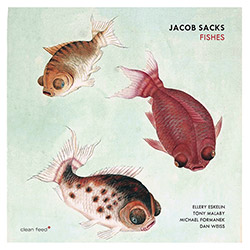
Fishes finds New York Pianist/Composer/Teacher Jacob Sacks recording his first record with Clean Feed by surrounding himself with a quintet of fellow New Yorkers and Clean Feed colleagues for one of the better sets of adventurous jazz you're likely to hear from 2018. The band consists of veteran saxophonist Ellery Eskelin on tenor, Tony Malaby on tenor and soprano saxophones, Michael Formanek on double bass, and Sacks' longtime friend and collaborator Dan Weiss on percussion. Fishes finds the band navigating Sacks' sophisticated, yet thoroughly engaging compositions that exhibit shades of Charles Mingus and Thelonious Monk in their use of simple structures within complex arrangements.
"Saloon" begins with a brief, playful tenor sax dialogue between Eskelin and Malaby before the rest of the group swings into place led by Sacks' bouncing piano figure. This sets up a brief solo by Sacks followed by clean, breathy runs from the saxophones. It's a really nice opener that shows off Sacks' capabilities as well as those of the band he's got assembled here. The next track "Carnegie the Sketcher" is measured and probing, played in a relaxed and pointillistic manner, Malaby's reedy soprano saxophone gives the piece a third stream vibe. "This is a Song" hops along on a particularly swinging bass line accented with Weiss' high-hat chatter. The saxophones and piano layer melody over the top of the mix, displaying nimble runs and lively interactions in a surfeit of colors and variation. "Carnegie Kveches If" is a brief sketch in which Sacks provides sparse, probing chords as accompaniment for the squelching reeds. Formanek and Weiss fill in the empty spaces with rhythmic shading, judiciously applying accents to an already busy track. "The Opener" begins with a melody, variations of which are played throughout by Sacks while the saxophones take turns soloing. Eskelin contrasts rough tenor growl with breathy restraint. Malaby delivers one of the better soprano solos I've heard in some time on this track. His powerful delivery and smooth fingering remind me of young Coltrane. His playing shows off his command of the instrument as well as his excellent technique. Sacks plays a brief and intentionally disjointed solo, weaving flashes of the theme with plonking chord progressions and curt flights along the keyboard.
"Carnegie Echos Kent" immediately expands in all direction, like marbles spilled from a jar. High pitched saxophone figures mingle with Sacks' tinkling keys over an understated, inquisitive rhythm. "Five Little Melodies" finds Malaby switching back to tenor saxophone and exchanging gestures with Sacks and Eskelin with Formanek utilizing both arco and pizzicato phases over Weiss' barely there percussion. "Carnegie Chutes Fork" is a busy number that gives the impression of motion, the saxophones and piano moving quickly with the bassline. Malaby offers some splattery reed squealing goodness on the soprano towards the end. "Chopped In" begins with Formanek surveying the space with dim arco lines. Sacks emerges with tingling note clusters, like sparks over a bonfire, ushering in the group. The horns illuminate any unseen edges of his construct, tracing their accents in hissing phrases and held notes. "Carnegie Stock Thew" is a short and fragmented piece of music that plays out as a fascinating dialogue between the musicians. The final piece, "Ill Blues" has an Ornette-esque 70's free jazz arrangement with a header section concluded with some great solos by the band.
Overall Fishes is an excellent record by one of New York's most talented composers. I really enjoyed the choice of musicians as well, with Malaby proving to be particularly versatile in his tonal palette across only two instruments. And although the compositions here are challenging, they is plenty of melody folded into the pieces. Many of the more challenging bits (the "Carnegie" themed pieces in particular) are highly ornate and abstract miniatures in which single ideas are explored, and due to the short duration their non-linarites are never tiresome. This is a terrific album from one of the most creative composers in new music.
Comments and Feedback:
|



